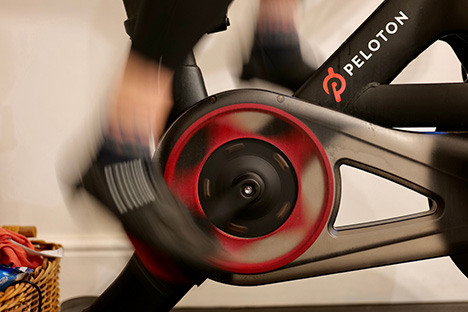Very few companies’ stock prices benefited more from the pandemic than exercise equipment manufacturer Peloton Interactive‘s (Nasdaq: PTON).
Peloton has a two-pronged business model.
First, the company sells customers fitness equipment in the form of exercise bikes, treadmills and rowers.
Second, these customers pay a monthly membership fee to access Peloton’s fitness classes, which they can view on a screen that comes with the exercise equipment.
The recurring revenue stream that those monthly membership payments create is all profit margin and looks very attractive to investors.
During the pandemic – with gyms closed and people locked in their homes – sales of Peloton products skyrocketed.
In its fiscal 2019, the company earned $915 million in revenue. By 2021, revenue had surged to exceed $4 billion.
Peloton’s stock price exploded higher.
Over the nine months that followed the COVID-19 outbreak in the U.S., Peloton’s share price jumped 738%.

But that was the peak. From there, everything has gone speeding downhill.
From the January 2021 top at $167, the stock price has now collapsed to below $8 – an unfathomable 95% drop!

Due to the huge decline in Peloton’s share price, the market valuation (enterprise value) of Peloton has fallen from a peak of $47 billion in January 2021 to just $3 billion today.
Ouch!
After a drop that large, a person has to wonder…
Have Peloton shares finally rolled into bargain territory?
An examination of Peloton’s financial statements makes it hard to believe that they have.
For the company’s last full fiscal year, which ended on June 30, 2022, it posted a massive loss of $2.8 billion. For the first nine months of the current fiscal year, Peloton posted another loss of $1.02 billion.
Peloton has plenty of revenue… but no profits to show for it.
While putting up these horrific earnings numbers, the company has also been burning through cash.
Last year, operations burned through $2 billion. This year, the company has gone through another $332 million. That cash burn has added debt to the balance sheet and diluted common shareholders, as the company had to issue shares to raise capital.
To address this poor financial performance, management instituted a plan to cut $800 million in spending annually. This is going to come from a reduction in both the cost to make Peloton products and operating expenses.
That is definitely going to help… if the company can make it happen. But as of now, Peloton is still unprofitable and burning cash.
Despite the huge decline in Peloton’s share price and the popular products that it offers, this is not a hard decision for me: I want to avoid this stock.
The key to successful long-term investing is to own great companies that generate free cash flow. Not companies that burn through cash.
Peloton has enough cash on its balance sheet to keep itself out of bankruptcy for the foreseeable future, but that alone is no reason to want to own it. The financial performance here needs to change radically for this stock to offer value.
The Value Meter rates Peloton as “Extremely Overvalued.”

